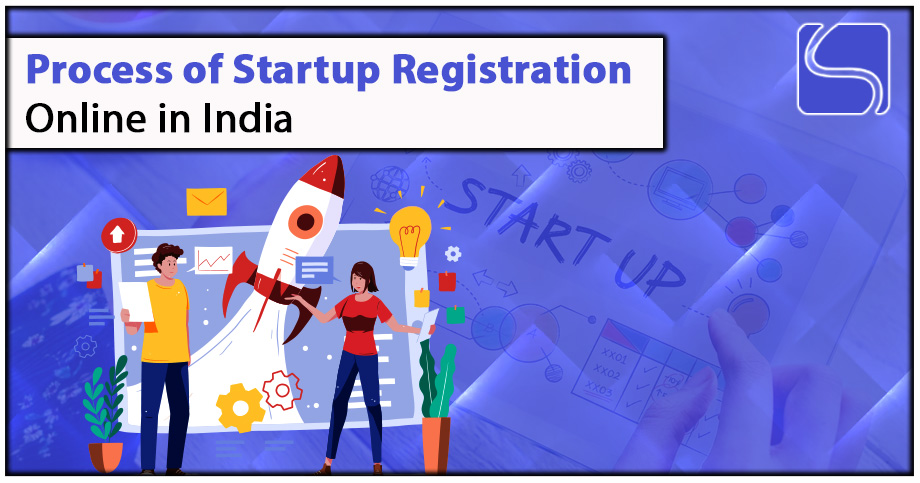Process of Registering a Startup Online in India

Shivam Narwal | Updated: Apr 10, 2023 | Category: Startup
Commencing a new business is an exhilarating and demanding undertaking requiring extensive planning and preparation. One of the most pivotal phases in commencing a business is enrolling it with the administration. Enlisting a business can be a protracted, intricate, and costly process. Nonetheless, the progress of technology has made it more feasible for entrepreneurs to register their businesses online, which is now a more accessible and economical alternative.
The Indian government has implemented numerous measures to foster innovation and entrepreneurship. Among these efforts is the launch of various initiatives, such as the Startup India program, designed to assist startups by offering funding, mentorship, and additional resources. This has led to a significant surge in the startup landscape in India in recent years, with many young entrepreneurs establishing their businesses and making valuable contributions to the economy.
With the availability of online registration, the process of registering a startup in India has become much simpler and faster. Entrepreneurs can now register their businesses from the comfort of their homes or offices and avoid the hassle of dealing with paperwork and government officials. Additionally, the online registration process is more cost-effective than registering a business offline, as it eliminates the need for intermediaries and reduces administrative costs.
In this blog, we will discuss registering a startup online in India, including the types of startups, the benefits of online registration, and the steps involved in the registration process. By this blog’s end, entrepreneurs will better understand the process and be well-equipped to register their startups online in India.
Table of Contents
Definition of Startup
A startup refers to a recently established business in its initial phase of operation, usually set up by entrepreneurs with creative business ideas. In India, the Ministry of Commerce and Industry has outlined a startup as a business entity that is under a decade old, generates an annual turnover of less than INR 100 crore, and is involved in the innovation, development, deployment, or commercialization of new products, processes, or services driven by technology or intellectual property. Entrepreneurs can register their startups in India as sole proprietorships, partnership firms, limited liability partnerships (LLPs), private limited companies, or one-person companies (OPCs). The decision of which business entity to choose would depend on the entrepreneur’s business model, funding requirements, and the degree of liability protection required.
Types of Startups
Different types of startups can be registered online in India. They are as follows:
- Private Limited Company – This kind of business entity is the most favoured among startups. A private limited company is characterized by its distinct legal personality, limited liability for its shareholders, and the ability to secure funds via equity or debt.
- Limited Liability Partnership (LLP) – An LLP is a hybrid structure that benefits both a partnership and a company. It is a separate legal entity, and its partners have limited liability.
- One-Person Company (OPC) – An OPC is a company a single person can start. It is a separate legal entity and has limited liability for its shareholders.
- Sole Proprietorship – A sole proprietorship pertains to an unregistered enterprise possessed and operated by a lone person. It lacks a distinctive legal personality, and its proprietor has unrestricted accountability for the business’s dealings.
Benefits of Registering Startup Online
The process of registering a startup online in India offers several benefits for entrepreneurs, including:
- Convenience: Online registration eliminates the need for entrepreneurs to visit government offices physically, which can save them time and effort.
- Cost-Effective: Online registration is more cost-effective than offline registration, as it eliminates the need for intermediaries and reduces administrative costs.
- Faster Processing: Online registration is faster and more efficient, as the entire process can be completed online in simple steps.
- Accessible: The online registration process is accessible to entrepreneurs from all parts of the country, including remote areas, and helps to promote inclusivity and diversity.
- Transparency: The online registration process is transparent, and entrepreneurs can track the status of their applications at every stage, reducing the risk of corruption and fraud.
- Ease of Compliance: Online registration also simplifies complying with various legal and regulatory requirements, such as obtaining a PAN card, GST registration, and opening a bank account.
- Government Support: Registered startups are eligible for various government incentives, such as tax exemptions, funding, and subsidies, which can help entrepreneurs to scale their businesses.
- Brand Value: A registered startup has higher credibility and brand value than an unregistered one, which can help entrepreneurs to attract investors and customers.
Overall, the online registration process for startups in India offers several benefits for entrepreneurs, including convenience, cost-effectiveness, faster processing, accessibility, transparency, ease of compliance, government support, and enhanced brand value. By registering their startups online, entrepreneurs can save time and effort and focus on scaling their businesses.
Steps Involved in Registering Startup Online
Now that we understand what a startup is, its types, and the benefits of online registration, let’s discuss the steps involved in registering a startup online in India.
- Obtain Digital Signature Certificate (DSC): The initial phase of the registration procedure involves obtaining a Digital Signature Certificate (DSC[1]), which is necessary for applying digital signatures to the registration documents.
- Register on the MCA portal: After obtaining the DSC, the subsequent stage is to enroll on the Ministry of Corporate Affairs (MCA) platform by submitting fundamental information such as the names, email addresses, and contact numbers of the intended directors and shareholders.
- Apply for Director Identification Number (DIN): Subsequently, the succeeding phase requests a Director Identification Number (DIN) for the proposed directors by submitting the requisite papers via the Internet.
- Name Approval: Upon being granted the DIN, the ensuing step is to file an online application for the approval of the startup’s name. The submission must contain up to six suggested names and the corresponding payment of fees.
- Incorporation Documents: Once the name is approved, the next step is to prepare and file the incorporation documents, including the Memorandum of Association (MOA) and Articles of Association (AOA) and the declaration of compliance.
- Pay the Registration Fee: Once the incorporation documents are approved, the entrepreneur needs to pay the registration fee online.
- Obtain Certificate of Incorporation: Once the registration fee is paid, the Registrar of Companies (ROC) will issue a Certificate of Incorporation (COI) online, which marks the successful completion of the registration process.
- Obtain Permanent Account Number (PAN) and GST Registration: After obtaining the COI, the entrepreneur needs to apply for a PAN and GST registration to start their business operations legally.
It is important to consider that the precise process may differ depending on the selected business entity and other relevant factors. Nonetheless, adhering to the aforementioned stages will assist entrepreneurs in successfully registering their startups online in India.
Conclusion
Embarking on the journey of starting a business can be intimidating, but the process of registering a startup online in India has become more accessible and cost-effective. The government has made strides to simplify the process, making it more efficient, transparent, and speedy. By following the steps outlined above, entrepreneurs can register their startups with ease and take advantage of the government’s benefits. However, it’s crucial to remember that registration is merely the first step in starting a business. Founders must focus on developing a comprehensive business plan, obtaining funding, and building a strong team. It’s also essential to stay informed about the latest government policies and regulations that may impact the business. By taking a methodical approach and keeping these factors in mind, startups in India can position themselves for success.
In summary, registering a startup online in India has become a straightforward process that provides entrepreneurs with access to various startup types and numerous benefits, such as limited liability, funding opportunities, and a streamlined registration process. The government’s significant efforts to promote entrepreneurship in India have contributed to the thriving startup ecosystem. By following the steps mentioned above, aspiring entrepreneurs can bring their business ideas to fruition and make significant contributions to India’s economic growth.














